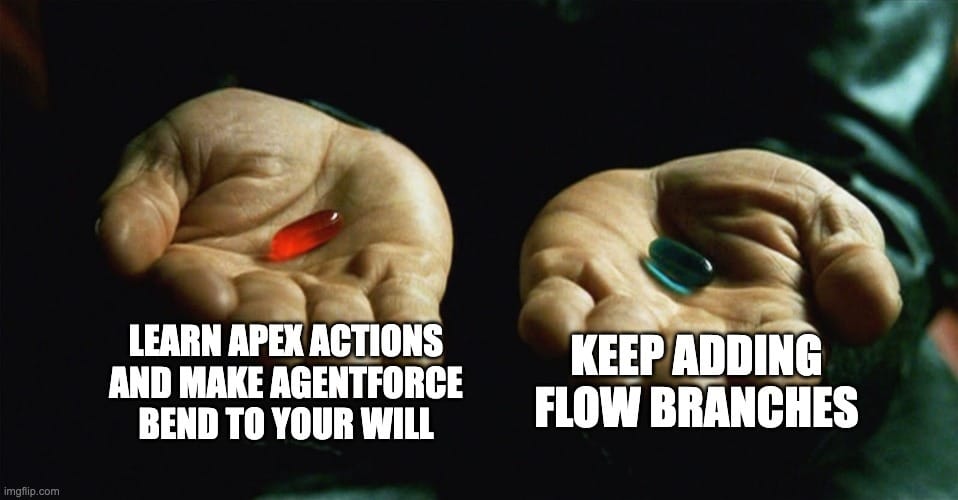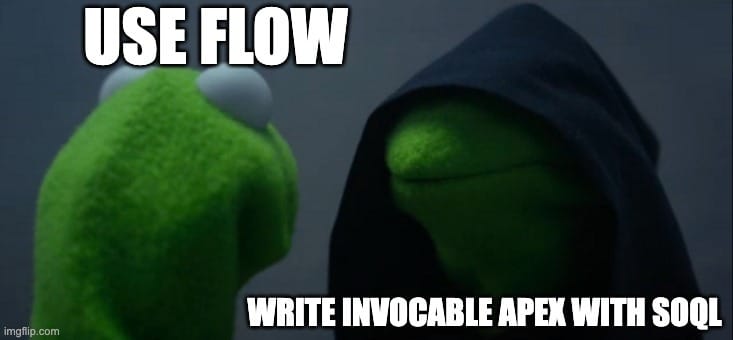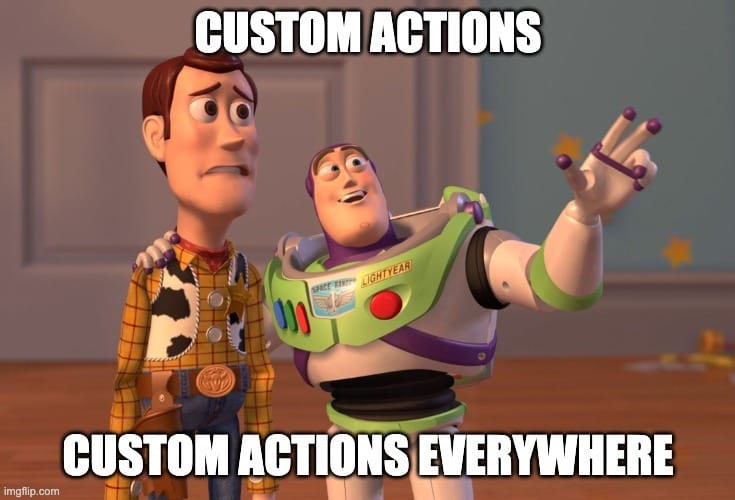- SalesforceChaCha
- Posts
- 💃 Apex, Meet Agentforce 🕺
💃 Apex, Meet Agentforce 🕺
Level up your Agentforce implementation with Apex
Good morning, Salesforce Nerds! We alll know that Agentforce is already a leap forward for AI-powered service.
It can route cases, surface knowledge, and act like your best support rep on their third cup of coffee.
But what if you need it to do more than just parrot data? 🤔
That’s where custom actions come in. These let you plug in Apex logic behind the scenes and make your digital agents way smarter.
Think:
⚡ Eligibility checks
⚡ Account risk scoring
⚡ Entitlement validation
⚡ Org-specific “next-best-action” logic that Flow just can’t elegantly handle
You write the logic in Apex.
You register it as a custom action.
You connect it to your conversational agent.
And just like that, you’ve created a Salesforce-powered brain extension. 🧠

TABLE OF CONTENTS
💃 Apex, Meet Agentforce 🕺
BRAINS NEED INTERFACES TOO
ANATOMY OF AN ACTION
At its core, a custom Agentforce action is a public, stateless Apex class containing a method annotated with @InvocableMethod.
This is old news to anyone who's built Flow actions. But, with Agentforce, there are some key differences:
⚠️ Inputs/outputs must be JSON-serializable
Stick to primitives, Strings, Dates, Lists, and simple Apex objects (aka POJOs).
Avoid SObjects and maps like the plague.
🧭 Contextual awareness is key
Your action might get invoked mid-conversation.
That means request context matters. Keep your inputs focused and avoid side-effects or long DML operations.
📣 You must register the action
Apex alone isn’t enough.
Agentforce needs to know your method exists.
That’s where the AgentActionDefinition metadata and setup steps come in (more on that below 👇).
Here’s a simple Apex example to whet your appetite:
global class DiscountEligibilityAction {
global class Input {
@InvocableVariable(label='Customer ID')
public String customerId;
}
global class Output {
@InvocableVariable(label='Is Eligible')
public Boolean isEligible;
}
@InvocableMethod(label='Check Discount Eligibility')
global static List<Output> check(List<Input> requests) {
List<Output> results = new List<Output>();
for (Input request : requests) {
Output o = new Output();
o.isEligible = [SELECT TotalPurchases__c FROM Account WHERE Id = :request.customerId].TotalPurchases__c > 1000;
results.add(o);
}
return results;
}
}Simple? ✅
Powerful? Oh yeah. 🔥
AGENTFORCE CAN’T READ YOUR MIND
REGISTER AND ROLL
Writing the Apex is only half the job.
To make it usable, you have to register your Apex class as a custom action in Salesforce.
Here’s how to do that:
🧭 Go to Setup → Agent Actions
🆕 Click “New Action”
🔧 Choose “Apex Invocable Method”
📄 Select your method from the dropdown (Salesforce auto-detects @InvocableMethod classes)
🧩 Add input/output mappings (important for conversation design)
✅ Activate the action
Boom. 💥
You’ve just injected custom logic into your digital agent’s toolbox.
💡 Pro tip:
Use clear, human-readable names for your action and its fields. These show up in prompt engineering and action selection later. 🤙
DON’T BRING APEX TO A FLOW FIGHT
WHEN SHOULD YOU EXTEND?
Agentforce already works beautifully with Flow, Einstein Copilot, and more.
So when should you reach for Apex?
Use custom actions when:
🧠 You need complex branching or rules logic
🔍 You depend on SOQL, DML, or platform events
♻️ You want to reuse existing Apex code
🔐 You need to enforce governance or limit Flow access
Avoid Apex if:
🧾 Flow can handle the logic in fewer than 5 steps
🧪 You’re juggling highly dynamic data structures (like Maps or deeply nested custom objects)
⏳ You’re in a crunch and don’t want to wrangle test coverage
Custom actions are powerful, but only when the juice is worth the squeeze. 🍊
DON’T MAKE DUMB SMART BOTS
BEST PRACTICES & PRO TIPS
Here’s how to ensure your custom actions are fast, flexible, and production-ready:
🔁 Keep it idempotent
Agentforce may retry the action or run it in parallel contexts. No side-effects, no surprises.
🧼 Design for testability
Wrap logic in service classes. Write tests for both the action wrapper and your core logic.
⚡ Use Platform Cache
For common lookups or reference data. Reduce SOQL and speed things up.
📉 Log responsibly
Debug smart. Redact sensitive data. Remember, this runs in a conversational context. 🗣️
🚀 Deploy like a pro
Use metadata API or Gearset pipelines. Include AgentActionDefinition in your DX project for version control.
📚 Document the action
Treat it like a public API.
Define inputs, outputs, example payloads, and retry behavior in Confluence, Git, or wherever your team lives.
APEX ACTIONS ARE YOUR EDGE
THE FINAL BYTE
Agentforce is amazing out of the box, but it wasn’t built for your business’s weird billing logic, your 17-stage escalation rules, or your deeply custom loyalty scoring model. 🧾🏁🏆
That’s your job.
And now, with Apex-driven custom actions, you’ve got the freedom to wire all of that directly into the conversational flow.
No prompt hacks. No fragile Flow spaghetti.
Just clean, testable logic wrapped in a bow. 🎁
So the next time someone says:
“Can our digital agent check if the customer’s VIP discount resets based on their shipping history in the last 12 months, unless they paused their subscription?”
You can smile and say:
“Yeah, I’ll write a custom action for that.” 😎
SOUL FOOD
Today’s Principle
"Whatever you are studying right now, if you are not getting up to speed on deep learning, neural networks, etc., you lose. We are going through the process where software will automate software, automation will automate automation."
and now....Salesforce Memes



What did you think about today's newsletter? |